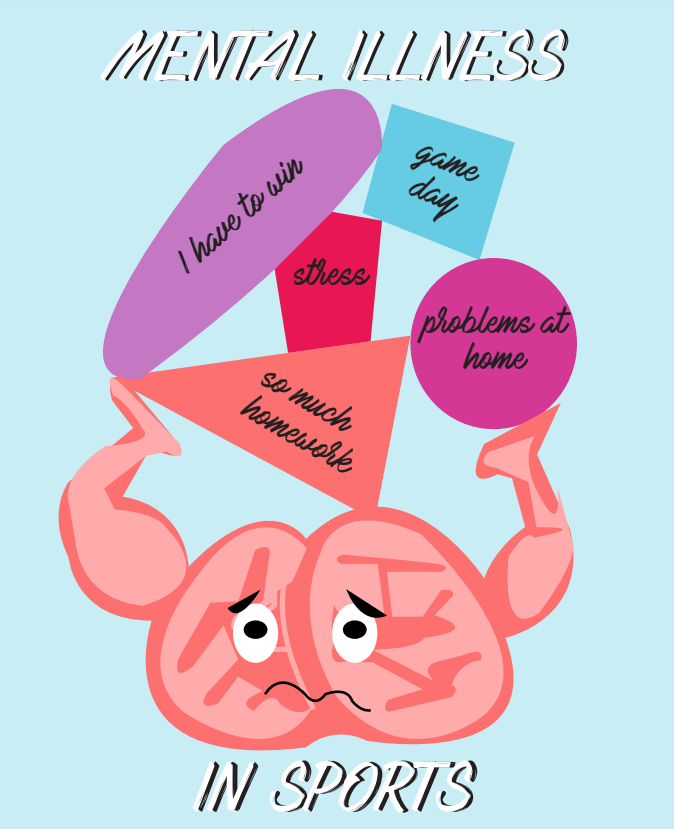
Athletes navigating the Pressures of Life: Mental Health in Today’s World
In the last few years, especially after this past year and a half of a pandemic, there are at least two words that have become a household topic. It’s not as if this was never important before, but COVID-19 has thrust us into REALLY having to take a hard look! MENTAL HEALTH is no longer a passive or taboo discussion. We have learned that Mental Health is probably the topic we should be addressing as much as cancer, AIDS, or any other medical ailment. Moreso because our mental health directly impacts our physical and spiritual ability to deal with the othersAccording to the National Alliance on Mental Health (NAMH), 1 in 5 Americans suffer from Mental Illness each year. 75% of lifetime mental illness begins between the ages of 14 and 24. When we think of those humans affected, we tend to not think about the wealth, fame status , or athletes. It seems our expectation is that folks of a certain class or status are immune. Although we have seen the likes of Whitney Houston, Prince, John Ritter, Robin Williams, Michael Phelps and others fall, somehow we still have this perception that depression is reserved for the poor or less fortunate. Somehow, we collectively respond in SHOCK and AWE, as if this hasn’t happened before. In the wake of recent revelations of two young female athletes, Naomi Osaka and Simone Biles, have publicly taken a stand and opened up about their own battles with mental health issues–here we are SHOCKED again! I am personally proud of both of them for drawing a line for themselves. Clearly, their collective wellness is NOT what is most important for America. We just want them to “shut up and dribble”–I think that is how one commentator referenced Lebron James for taking a stand on another issue. Sorry, I digressed!
May 2021, Naomi Osaka withdrew from the French Open. Naomi boycotted the press events and was fined $15,000. She was called a “Diva”. Naomi disclosed that she had been battling social anxiety and depression. She has always appeared to be an introvert and after winning her 1st US Open Championship in 2018, the press left a not so pleasing impression on her. She found herself nervous and, ultimately, too stressed to engage.
2021 Tokyo Olympics, the young woman known as the G.O.A.T. of gymnastics, the 7 medal Olympian, Simone Biles, withdrew from the team all-around competition. Biles admitted to having issues with mental health in the past. This time was different for her. Biles was worried for her well-being. The stress of the Olympic process, followed by a pandemic, the Olympic wait, then Olympic trials again, stress of the Olympics, and the stress of the week took a toll on her. Gymnastics was no longer fun and risking the American team a medal due to lack of focus wasn’t an option for her. Michael Phelps, in agreement with Simone stated, “being an Olympic athlete is overwhelming. You feel like you have the weight of the country on your shoulders. It can be lonely. All you want is someone you can trust, that will let us be ourselves, someone that listens, allows you to be vulnerable, someone that doesn’t have expectations, but, most importantly, someone who is not gonna try to fix us.” Biles said it best, “It is ok to not be ok.”
On the other hand, track star, Sha’Carri Richardson, was kicked off the Olympic team because she tested positive for marijuana after her Olympic trial win. ShaCarri’s mother passed away and a week later she was running in the Olympic trials. She says she didn’t know any other way to deal with all the grief and pressure she was under so she turned to marijuana to help her relax. Richardson was criticized for her method of dealing with her mental health issues.
Americans are fickle. Society has become polarized. You are either a “Winner” or a “Quitter”. This view is a reason why the conversations are hard to have in society. Some people take days, weeks, months off for physical health. Mental health is even more important to the recovery process. . Recognize the issue, then take a step away to regroup, even if it is the biggest game of your life. These people (athletes, singers, actors, doctors, nurses, janitors etc) have a responsibility to take care of themselves before helping America (win any more medals). The audacity of us to collectively think they should sacrifice more of themselves. For those who disagree, I have 2 simple questions, who are you? What are you sacrificing for America?
If you or anyone you know is suffering from depression, anxiety, grief, bipolar disorder, post-traumatic stress disorder (PTSD), and eating disorders please call Substance Abuse and Mental Health Services Administration (SAMHSA) National Helpline: 1-800-662-HELP (4357).
Photo credit: Sydney Campbell-www.thepalmettopanther.com
